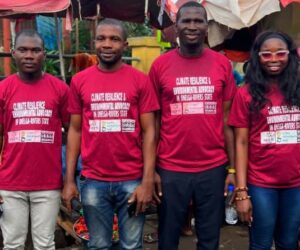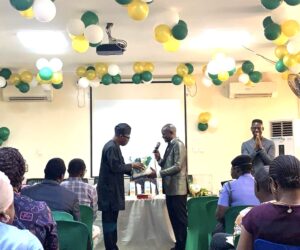1
LAGOS – Nigeria’s leading fertility experts have decried the country’s lack of a unified regulatory framework for In Vitro Fertilisation (IVF) and other Assisted Reproductive Technologies (ART), saying it has escalated into a full-blown medical emergency.
In states where oversight is absent, patients are being subjected to substandard, unverified procedures by unlicensed operators -placing their reproductive health, psychological wellbeing, and financial stability at serious risk.
The Association for Fertility and Reproductive Health (AFRH) has condemned the proliferation of unregistered fertility clinics and quack practices, describing the situation as a “clinical free-for-all” that undermines patient safety and professional integrity. Without enforceable national standards, couples seeking medical intervention for infertility are navigating a perilous landscape riddled with misinformation, malpractice, and exploitation.
Experts stressed that ART procedures- such as IVF, egg donation, and surrogacy – are complex medical interventions requiring stringent protocols, ethical safeguards, and highly trained personnel. The absence of a legal framework not only jeopardises treatment outcomes but also leaves patients vulnerable to emotional trauma and financial ruin.
AFRH called on federal and state governments to urgently enact comprehensive legislation that governs the licensing, monitoring, and data reporting of fertility clinics nationwide. Such a framework must include mandatory registration, outcome tracking, and patient protection measures to ensure that reproductive care in Nigeria meets global medical standards.
AFRH revealed that only Lagos State upholds minimum practice standards in partnership with the body. Beyond its borders, rogue clinics and quack practitioners exploit the regulatory void, offering unmonitored services that jeopardise patient safety. AFRH officials describe the situation as “reckless” and “unacceptable” in a modern healthcare system.
At a recent press briefing in Lagos to announce its 15th Annual International Conference, AFRH highlighted another worrying trend: rampant misinformation on surrogacy and egg donation. Practitioners struggle to have their expertise heard in legislative debates that routinely exclude them. Bills on assisted reproduction are drafted in isolation, heightening the risk of damaging laws that overlook patient welfare. From 23 to 26 September 2025, the conference, titled, New Frontiers in ART: Road Map to the Future will break new ground by opening its doors to the general public. For the first time, visiting couples and individuals can engage directly with fertility specialists from Nigeria and abroad. Sessions will span the latest innovations in assisted reproductive technology and confront the stigma that shadows one in six couples.
AFRH acknowledges that high treatment costs remain a formidable barrier. It stresses, however, that genuine quality care demands substantial investment in skilled staff and imported technology. To mitigate costs, some clinics have struck partnerships with banks and state hospitals for discounted packages or flexible payment plans. Widespread insurance coverage for assisted reproduction, the experts lament, is still a distant prospect in Nigeria.
President-elect Dr Adewunmi Adeyemi-Bero underlined the conference’s pivotal role in securing world-class fertility care for Nigerians. “We tailor what we are able to access – technology, manpower and international knowledge – so that we can better care for couples trying to complete their families,” she said. Her remarks underscore the delicate balance between resource constraints and uncompromising standards.
Dr Adeyemi-Bero also condemned the exclusion of practitioners from state and federal legislative processes. She warned that laws crafted without clinical input risk inflicting harm on patients dependent on services like donor eggs and surrogacy. “These are medical interventions, not political talking points,” she insisted, urging lawmakers to involve AFRH at every stage of bill drafting.
On 23 September, AFRH said that it would specifically offer a Fertility Open House that will demystify the treatment journey with panel discussions on IVF, egg and sperm donation, and surrogacy. Attendees will receive free one-to-one consultations, gaining clarity on procedures that too often remain shrouded in secrecy. “Fertility challenges are medical conditions with medical solutions, not shameful secrets,” AFRH declared, aiming to shatter the silence that isolates countless couples.
Abiola Adewusi, chairperson of the local organising committee, hailed the Open House as a groundbreaking initiative. She urged the public to witness proper protocols in action while encouraging professionals to sharpen their skills and strengthen patient care. Attendance is free, with both physical and virtual participation options to maximise reach.
On 24 September, the specialised workshops will equip doctors with hands-on hysteroscopy and ultrasound training, instruct embryologists in advanced pre-implantation genetic testing, and guide nurses and counsellors in donor and surrogate management. Each session integrates the AFRH Registry, which records IVF cycles and outcomes, though many of Nigeria’s 100 registered clinics have yet to submit data. “Registering is free and delivers research opportunities and international recognition,” Adewusi explained.
The main scientific conference on 25 and 26 September features plenary sessions, presentations by international experts and the AFRH Annual General Meeting, culminating in a gala night. As fertility professionals unite under one roof, their message is clear: without robust national regulation and public engagement, Nigerian couples will continue to navigate a labyrinth of risk and misinformation.







